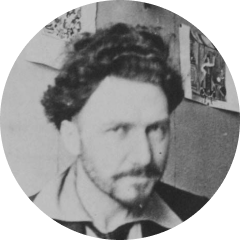Ezra Pound
(1885–1972)
Ezra Pound (1885–1972), American poet and critic, was one of the prime impresarios of the modernist movement in London and Paris, and played a major part in launching Eliot as poet and critic – as well as Joyce, Lewis, and many others. Eliot called on him at 5 Holland Place Chambers, Kensington, on 22 Sept. 1914, with an introduction from Conrad Aiken. On 30 Sept. 1914, Pound hailed ‘Prufrock’ as ‘the best poem I have yet had or seen from an American’; and on 3 October called Eliot ‘the last intelligent man I’ve found – a young American … worth watching – mind “not primitive”’ (Selected Letters of Ezra Pound, 40–1). Pound was instrumental in arranging for ‘Prufrock’ to be published in Poetry in 1915, and helped to shape The Waste Land (1922), which Eliot dedicated to him as ‘il miglior fabbro’. The poets remained in loyal correspondence for the rest of their lives.
Having initially dismissed Pound’s poetry (to Conrad Aiken, 30 Sept. 1914) as ‘well-meaning but touchingly incompetent’, Eliot went on to champion his work, writing to Gilbert Seldes (27 Dec. 1922): ‘I sincerely consider Ezra Pound the most important living poet in the English language’. He wrote an early critical study, Ezra Pound: His Metric and Poetry (1917), and went on, as editor of the Criterion and publisher at F&F, to publish most of Pound’s work in the UK, including Selected Shorter Poems, The Cantos and Selected Literary Essays.
After his move to Italy in the 1920s, Pound became increasingly sceptical about the direction of TSE’s convictions and poetry, but they continued to correspond. TSE told Ihor Kostetsky, 6 Jan. 1960, that the Cantos ‘is unquestionably the most remarkable long contemporary poem in the English language’. After Eliot’s death, Pound said of him: ‘His was the true Dantescan voice – not honoured enough, and deserving more than I ever gave him.’ See Selected Letters of Ezra Pound 1907–1941 ed. D. D. Paige (1950); Humphrey Carpenter, A Serious Character (1988); A. David Moody, Ezra Pound: Poet: A Portrait of the Man and his Work I: The Young Genius 1885–1920 (2007); II: The Epic Years 1921–1939 (2014); III: The Tragic Years 1939–1972 (2015).
